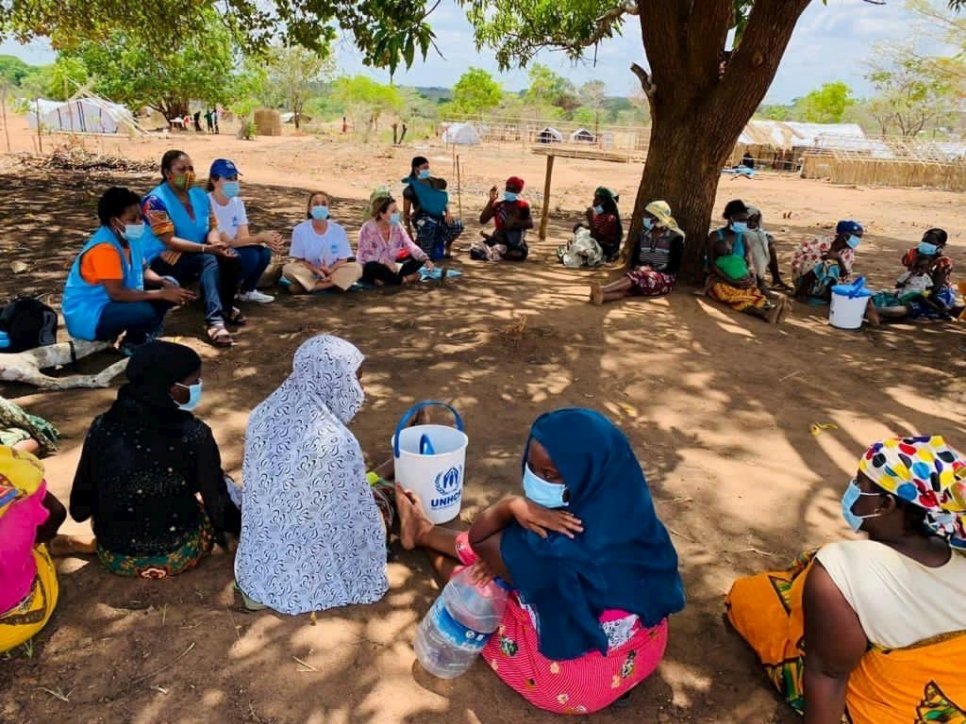More than 530,000 displaced in Mozambique's conflict-torn north
This is a summary of what was said by UNHCR spokesperson Babar Baloch – to whom quoted text may be attributed – at today's press briefing at the Palais des Nations in Geneva.

UNHCR staff meet with internally displaced people and local residents in Nanjua, Mozambique. © UNHCR/Deiliany Lazara de Souza
UNHCR, the UN Refugee Agency, is deeply concerned over the rising number of civilians displaced in the northern parts of Mozambique as attacks by non-state armed groups (NSAGs) continue to rage in Cabo Delgado province.
More than 530,000 people are now displaced in Cabo Delgado, Nampula, Zambezia and Niassa provinces, according to official estimates, as numbers continue to increase daily.
During the last few days, attacks conducted by armed groups have increased significantly in Palma, Nangade and Macomia districts. Many people have been forced to move multiple times, and the situation of those affected by the conflict is worsening rapidly.
The majority of the affected families have sought refuge in the safer southern districts of Cabo Delgado province, where around 90 per cent of those displaced are sheltered by host communities.
The situation in Cabo Delgado is a protection crisis for more than half a million civilians on the run, with widespread reports of human rights abuses and disregard for international humanitarian law.
More than 2,000 people have been killed since the conflict started in 2017. In the violence houses have been looted and burned, families separated and health centres and schools seriously damaged. Access to agricultural land has been blocked and other economic activities curtailed. There is serious indication that this crisis could spread beyond the country’s borders.
Access to some areas in Cabo Delgado – such as Nangade, Mocimboa da Praia, Muidumbe, Macomia, Meluco and Quissanga – remains limited due to violence, insecurity and the rainy season, with certain communities being cut off from basic services for months.
People have been forced to flee their homes with few possessions, in most cases without their identification and civil documents, further increasing their vulnerability. Some women and girls have been abducted, forced into marriages, in some cases raped, or subjected to other forms of sexual violence. The displaced population remains significantly vulnerable to gender-based violence (GBV).
UNHCR is working to identify and address the main needs of the displaced people and host communities, as well as to ensure that basic international humanitarian principles are upheld. Our protection team is for instance constantly monitoring the situation on the ground in Cabo Delgado and other northern provinces to identify and respond to humanitarian needs.
UNHCR’s assistance for displaced populations in support of the Government of Mozambique, includes shelter materials, core relief items such as tarpaulins, sleeping mats, blankets, kitchen sets, buckets, jerry cans and solar lamps. In addition to essential protection services, gender-based violence risk mitigation and response activities, UNHCR is supporting efforts to ensure the integration of displaced families into host communities. So far approximately 20,000 people have received vital relief items and in the coming months we expect to assist thousand more.
UNHCR is part of inter-agency response reflected in the newly humanitarian appeal launched today by the UN system in Mozambique. Our earlier regular funding needs of US$19 million is just 39 per cent funded.
For more information on this topic, please contact:
- In Maputo, Francesca Fontanini, [email protected], +258 84 312 0930, +39 329 700 4399 (WhatsApp)
- In Maputo, Juliana Ghazi, [email protected], +258 84 321 1545, +1 917 628 9073 (WhatsApp)
- In Pretoria, Helene Caux, [email protected], +27 82 376 5190
- In Geneva, Babar Baloch, [email protected], +41 79 513 9549
- In New York, Kathryn Mahoney, [email protected], +1 347 443 7646
